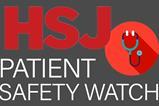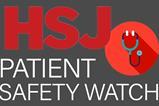HSJ is now hosting the Patient Safety Watch newsletter, written by Patient Safety Watch chief executive James Titcombe.
Welcome to the latest edition of the Patient Safety Watch newsletter.
Along with hundreds of others, I attended the HSJ Patient Safety Congress last week. It was an insightful event and a hopeful reminder of how many good people are working to improve patient safety and how much positive work is in motion. If you’re looking for some evidence of this (and perhaps a little inspiration!), look no further than this year’s HSJ Patient Safety Awards winners. A huge congratulations and thanks to all the winners and runners-up.
Sadly, the news over the last fortnight contains plenty of stories illustrating how much more we need to do…
‘Zero harm is unachievable’, says patient safety director
Speaking at HSJ’s Patient Safety Congress, national patient safety director Aidan Fowler warned about giving “false hope” that “zero harm” could be achieved: “The dream of zero harm is appealing. It’s what we all want. But it’s unachievable in reality, it’s unmeasurable [and] it carries risk.”
He added that while providers should strive to keep harm to a minimal level, pushing for zero harm risked “creating unrealistic expectations and burning them [staff] out”.
It’s a view I’ve heard from many patient safety experts in recent years, but, for me, the issue boils down to interpretation. If we are going to set an ambition for how much avoidable harm any healthcare system creates (and yes, the term ‘avoidable’ in this sense is again problematic!), ‘zero’ feels to me like the right one. Not as a target with consequences, but as a mindset that says, “while zero isn’t the reality here, we’ll strive to improve”.
Viewed this way, and in recognition that any ‘number’ above ‘zero’ is someone’s child, brother, sister, mother, father, or friend, perhaps it’s not such a controversial concept?
Nottingham trust to investigate ‘150-200’ cases on top of Ockenden inquiry
The Sunday Times has reported Nottingham University Hospitals Trust has agreed to fund ‘independent clinical reviews’ for ‘at least 150’ families with concerns relating to maternity care in addition to the 1,800 being looked at by the ongoing Ockenden review.
The trust’s CEO Anthony May said: “We know that there are mothers and families that have concerns about their care, but whose cases don’t fit into the scope of the independent review… we are committed to hearing from and listening to those individuals so that we can understand fully what happened in their care and learn from it.”
Mother left ‘too scared’ to try for another child
The Parliamentary and Health Service Ombudsman has published a damning report into the maternity care of a 39-year-old woman who said her experience at Northampton General Hospital Trust has left her “too scared to have another baby”.
The Ombudsman found the trust failed to act in line with National Institute for Health and Care Excellence guidance by not examining the woman when she was having regular painful contractions and by failing to provide timely and effective pain relief. There was also a failure to in not getting her partner to the hospital.
Ombudsman Rob Behrens said: “Sadly, this is yet another example of a woman being let down by medical staff during what should have been one of the happiest times of her life.
“When the patient tried to complain and raise her concerns, she wasn’t listened to. Instead, she was faced with a dismissive attitude that is unfortunately all too common in the NHS and has a direct impact on patient safety.”
Whistleblower tells tribunal he faced ‘brutal retaliatory victimisation’
A widely respected consultant obstetrician, Martyn Pitman has claimed he was sacked from his job of 20 years at Winchester’s Royal Hampshire County Hospital for raising patient safety concerns over fears they would cause “reputational damage”.
The Guardian reports Dr Pitman told an employment tribunal he was “subjected to brutal retaliatory victimisation” after he criticised senior midwife colleagues.
In a statement, Dr Pitman said the 2012 merger of RHCH with Basingstoke and North Hampshire Hospital “proved challenging due to significant differences in the philosophy of care and management style” which included an emphasis on natural birth over caesareans.
The tribunal continues.
Hospitals accused of pushing ‘natural births’ despite years of scandals
An investigation by the Telegraph has found several hospitals are still promoting a “natural birth is best” philosophy, despite a bias towards natural birth having been implicated in a string of maternity scandals in recent years.
The newspaper claims a number of trusts were “boasting about the way they promote natural birth” in their documentation.
Health secretary Steve Barclay said mothers needed to “feel reassured their wishes are being respected and listened to when giving birth”, adding: “I am speaking with NHS leaders to ensure all trusts understand that the type of birth a woman has must reflect what she decides, wherever possible.”
It’s not pain, it’s power
Maternity campaigner Catherine Roy has drawn attention to material from Surrey and Sussex Healthcare Trust which describes ‘The Birth Comb – labour hack’. The material states acupressure points in your palm should be “tightly gripped” so the “pressure distracts your brain and supports the body to release endorphins”.
A harmless way of promoting choice or pseudoscience with no place in the NHS? You decide.
Bereaved parents call for national inquiry
Parents who have lost babies due to failings at maternity units have written to the government demanding a national inquiry into maternity services.
Richard Stanton and Rhiannon Davies lost their baby daughter, Kate, in 2009 and were later instrumental in campaigning for the Ockenden inquiry into maternity failures at Shrewsbury and Telford.
Speaking to ITV News Central, Richard said “For every family which has lost a baby, or a mother, or had a child come to harm because of the maternity services in the UK, and that was then proven to be avoidable, it’s a kick in the teeth.
“And when they don’t get answers, when they don’t get openness and honesty and an investigation into what happened, so that that can be brought into learning to ensure that never happens again, it just angers me and Rhiannon so greatly that actually we’re a step backwards from where we were 18 months ago.”
The letter, written after safety concerns were raised about University Hospitals of Leicester Trust’s maternity services, was also signed by fellow campaigners Colin and Kayleigh Griffiths.
In other news this edition…
Bullying concerns raised at ‘culture of fear’ trust
An independent review commissioned by University Hospitals Birmingham Foundation Trust has found 53 per cent of the 2,884 staff responding had felt bullied or harassed at work, while only 16 per cent believed their employer would deal with their concerns.
The trust has faced scrutiny after a critical BBC Newsnight investigation. The trust has apologised for “unacceptable behaviours” and said it is “committed to changing the working environment”.
According to the BBC, Richard Burden, chair of Healthwatch in Birmingham and Solihull, said: “This culture of fear, coupled with the perception of a board and management that is, at best, disinterested and, at worst, actively hostile to staff raising concerns, clearly has serious ramifications for patient safety.”
‘I feel terribly naive for trusting them’
The parents of a 20-year-old woman who died in hospital of sepsis have told The Guardian they believe her life could have been saved had her care been different. Maddy Lawrence was admitted to hospital following a rugby injury but her condition deteriorated after warning signs she had developed an infection were missed.
Maddy Lawrence’s father Simon told the newspaper: “We’re bewildered at how incompetent, uncaring and lax some of the medical staff were… The doctors showed no curiosity at all. I feel terribly naive for trusting them.”
Her parents are calling for sepsis to be treated as a never event and are backing Martha’s rule – which we discussed in the last edition of Patient Safety Watch – to grant easier access to a second opinion.
Parkinson’s patients not receiving medication on time
Research by Parkinson’s UK – and reported by The Independent – found more than half (58 per cent) of patients with Parkinson’s disease who were admitted to hospital last year did not receive their medication on time.
The charity warned medication was “time critical”, with a delay of even half an hour potentially leaving patients less able to walk or talk.
Parkinson’s UK director of external relations Juliet Tizzard said: “Given the serious risk of harm to the health of a person with Parkinson’s and the numbers affected, we believe this should be a high-priority patient safety issue.”
Calls for action on restorative practice in healthcare
The All-Party Parliamentary Group on Restorative Justice has published an important and insightful report, Implementing Restorative Practice in Education, Health, and Social Care.
The report highlights compelling examples of restorative practice in the NHS, but also stresses its implementation is variable and hindered by common obstacles, including lack of funding, insufficient leadership buy-in and the absence of cohesive government strategy.
Key messages for healthcare include that patient representatives felt the NHS’s ‘Just Culture’ framework did not sufficiently seek to address what is ‘just’ for patients and families harmed by safety incidents and that ‘restorative healing’ is not built into existing processes.
The report recommends developing a UK National Advocacy Service, led by independent advocates trained in restorative practice, to offer restorative processes to resolve issues caused by medical mistakes and negligence while supporting both staff and harmed patients and their families. This closely echoes the PHSO in its Broken Trust report as well as Action against Medical Accidents and the Harmed Patients Alliance in their recent Signpost to Nowhere report.
Sharing some good stuff…
Photographer eases lives of people with dementia
BBC News recently ran a lovely story about a photographer from Oxford, Chris Andrews who has produced a calendar designed to help people living with dementia. The memory calendar was designed to be displayed in a prominent position and carers, family members, or those cared for, can use it to enter important notes for each day, such as events, appointments and anniversaries. The calendar has been trialled by the Alzheimer’s Society and has received “more and more positive feedback” every year.
What can Safety Cases offer for patient safety?
THIS Institute has published a paper looking at the use of ‘Safety Cases’ in healthcare (a regulatory technique that requires organisations to demonstrate to regulators that they have systematically identified hazards in their systems and reduced risks to be as low as reasonably practicable).
As tends to be the case with everything produced by THIS Institute, it’s a superb, detailed and insightful piece of work, concluding that “the Safety Case approach was recognised by those involved in the Safer Clinical Systems programme as having potential value. However, it is also fraught with challenge, highlighting the limitations of efforts to transfer safety management practices to healthcare from other sectors.”
That is the end of this edition. Please look out for our next newsletter in two weeks’ time.
Thanks for reading and stay safe.
James Titcombe































2 Readers' comments